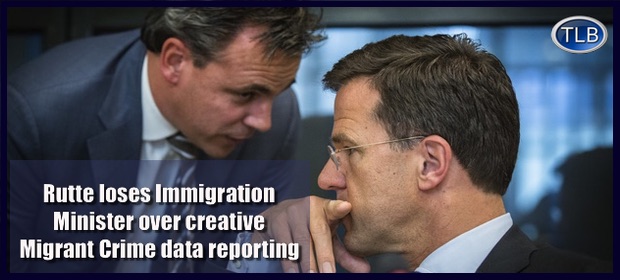
ER Editor: We also recommend this report by Euractiv titled Dutch minister resigns over manipulated report of crimes committed by asylum-seekers. One is left wondering how often this type of manipulation of migrant crime data by a standing government occurs just to advance an undemocratic open borders policy.
********
Dutch Asylum Minister resigns after faked report on migrant crime
The Dutch immigration minister has been forced to step down following a scandal over a government migrant crime report which hid serious migrant crimes including rape and murder under the category of “other”.
THE HAGUE – For the recorded crimes in which asylum seekers were the suspects, various misdemeanours, such as shoplifting and pickpocketing, were listed while, however, failing to identify much more serious offences like murder, child abuse, and rape.
Dutch daily, De Telegraaf reported on Thursday that the category included 79 alleged sex crimes, including 47 cases of sexual assault, five allegations of child abuse and four alleged rapes, plus a series of other violent offences.
Mark Harbers (pictured) said: “I am not only responsible in terms of the law, but I feel responsible.” He  maintains that no “deliberate concealment” of the figures had taken place, but said he took “full responsibility” for having “misinformed” the Dutch Parliament after resigning from his position on Tuesday.
maintains that no “deliberate concealment” of the figures had taken place, but said he took “full responsibility” for having “misinformed” the Dutch Parliament after resigning from his position on Tuesday.
The Asylum Minister resigned during a debate with MPs after being accused of attempting to hide the figures. Asked why the ministry again had failed to report the true extent of the potential involvement of asylum seekers in crime, Harbers said civil servants were worried that the figures would lead to “confusion”.
The figures, which were published last week, included at least 31 murders and 51 serious assaults under the heading “other”. Police registered cases such as physical abuse as well as threatening behaviour and some 1,000 incidents in the same category.
Last week’s Ministry of Justice report also showed that “fake” asylum seekers who come from so-called safe countries, namely Morocco and Algeria, were responsible for almost half the 4,600 incidents requiring police intervention.
De Telegraaf revealed the glaring omissions of the report last week, which Harbers had praised for its “full transparency”. According to Harbers at the time, “only by providing [such] insight can there be support for the reception of refugees”.
Dutch politicians hit out at the faulty report in the press. Freedom Party leader, Geert Wilders described the Justice Ministry as acting like “a mafia gang” for misrepresenting the real figures.
But Dutch prime minister Mark Rutte expressed great sadness over Harber’s resignation, tweeting:
“Politics can be tough. Respect for State Secretary Harbers’ decision to resign… But it is incredibly unfortunate that the cabinet must say goodbye to such a talented and committed liberal.”
The resignation was described in local media as a second “heavy blow” to the ruling VVD party, which already this year faced a major setback with the anti-immigration Forum for Democracy party, which went from zero seats to becoming the largest force in the Dutch senate at provincial elections in March.
 Mark Rutte’s televised debate with Forum for Democracy leader Thierry Baudet drew a record number of Dutch viewers this week.
Mark Rutte’s televised debate with Forum for Democracy leader Thierry Baudet drew a record number of Dutch viewers this week.
Rutte and Baudet went head to head on Wednesday night after the Prime Minister challenged Baudet to a live televised debate which lasted 65-minutes. Baudet has been described by Foreign Policy magazine last year as part of a “disease of Dutch white nationalism”.
In a review of the work of French novelist Michel Houellebecq, Baudet notably questioned whether women really want to be in “equal relationships”.
But Rutte’s strategy may have backfired against a polished, professional challenger like Baudet. Cas Mudde, a Dutch academic accused Rutte of “cynically” elevating Baudet to the status of sole opponent in an election campaign that centres on immigration.




